- Home
- Ian Fleming
Goldfinger (James Bond - Extended Series Book 7)
Goldfinger (James Bond - Extended Series Book 7) Read online
“Highly entertaining.”
—New York Times
“Maniacally readable.”
—Observer
“Goldfinger…will not let [Bond's] close admirers down.”
—Manchester Guardian
“Bond is what every man would like to be, and what every woman would like to have between her sheets.”
—Raymond Chandler
“A superlative thriller from our foremost literary magician.”
— New York Herald Tribune
“Outrageously improbable, wickedly funny, wildly exciting.”
— Manchester Evening News
“Fantastic...Nobody else does this sort of thing as well as Mr. Fleming.”
— Sunday Times
“Mr. Fleming is splendid; he stops at nothing.”
—New Statesman
THE JAMES BOND BOOKS
Casino Royale
Live and Let Die
Moonraker
Diamonds Are Forever
From Russia With Love
Dr No
Goldfinger
For Your Eyes Only
Thunderball
The Spy Who Loved Me
On Her Majesty’s Secret Service
You Only Live Twice
The Man with the Golden Gun
Octopussy and The Living Daylights
GOLDFINGER © Ian Fleming Publications Ltd 1959
Thomas & Mercer edition, October 2012
Ian Fleming has asserted his right under the Copyright, Designs and Patents Act 1988 to be identified as the author of this work.
James Bond and 007 are registered trademarks of Danjaq LLC, used under license by Ian Fleming Publications Ltd.
This book is sold subject to the condition that it shall not, by way of trade or otherwise, be lent, resold, hired out, or otherwise circulated without the publisher’s prior consent in any form of binding or cover other than that in which it is published and without a similar condition, including this condition, being imposed on the subsequent purchaser.
First published in Great Britain by Jonathan Cape in 1959.
All rights reserved.
The characters and events portrayed in this book are fictitious. Any similarity to real persons, living or dead, is coincidental and not intended by the author.
Published by Thomas & Mercer
P.O. Box 400818
Las Vegas, NV 89140
ISBN-13: 9781612185507
ISBN-10: 1612185509
Library of Congress Control Number: 2012913435
Goldfinger said, ‘Mr Bond, they have a saying in Chicago: “Once is happenstance, twice is coincidence, the third time it’s enemy action.”’
CONTENTS
PART ONE HAPPENSTANCE
1 REFLECTIONS IN A DOUBLE BOURBON
2 LIVING IT UP
3 THE MAN WITH AGORAPHOBIA
4 OVER THE BARREL
5 NIGHT DUTY
6 TALK OF GOLD
7 THOUGHTS IN A D.B. III
PART TWO COINCIDENCE
8 ALL TO PLAY FOR
9 THE CUP AND THE LIP
10 UP AT THE GRANGE
11 THE ODD-JOB MAN
12 LONG TAIL ON A GHOST
13 ‘IF YOU TOUCH ME THERE …’
14 THINGS THAT GO THUMP IN THE NIGHT
PART THREE ENEMY ACTION
15 THE PRESSURE ROOM
16 THE LAST AND THE BIGGEST
17 HOODS’ CONGRESS
18 CRIME DE LA CRIME
19 SECRET APPENDIX
20 JOURNEY INTO HOLOCAUST
21 THE RICHEST MAN IN HISTORY
22 THE LAST TRICK
23 T.L.C. TREATMENT
ABOUT THE AUTHOR
To my gentle Reader
William Plomer
PART ONE
HAPPENSTANCE
1 ....... REFLECTIONS IN A DOUBLE BOURBON
JAMES BOND, with two double bourbons inside him, sat in the final departure lounge of Miami Airport and thought about life and death.
It was part of his profession to kill people. He had never liked doing it and when he had to kill he did it as well as he knew how and forgot about it. As a secret agent who held the rare double−O prefix – the licence to kill in the Secret Service – it was his duty to be as cool about death as a surgeon. If it happened, it happened. Regret was unprofessional – worse, it was death-watch beetle in the soul.
And yet there had been something curiously impressive about the death of the Mexican. It wasn’t that he hadn’t deserved to die. He was an evil man, a man they call in Mexico a capungo. A capungo is a bandit who will kill for as little as forty pesos, which is about twenty-five shillings – though probably he had been paid more to attempt the killing of Bond – and, from the look of him, he had been an instrument of pain and misery all his life. Yes, it had certainly been time for him to die; but when Bond had killed him, less than twenty-four hours before, life had gone out of the body so quickly, so utterly, that Bond had almost seen it come out of his mouth as it does, in the shape of a bird, in Haitian primitives.
What an extraordinary difference there was between a body full of person and a body that was empty! Now there is someone, now there is no one. This had been a Mexican with a name and an address, an employment card and perhaps a driving licence. Then something had gone out of him, out of the envelope of flesh and cheap clothes, and had left him an empty paper bag waiting for the dustcart. And the difference, the thing that had gone out of the stinking Mexican bandit, was greater than all Mexico.
Bond looked down at the weapon that had done it. The cutting edge of his right hand was red and swollen. It would soon show a bruise. Bond flexed the hand, kneading it with his left. He had been doing the same thing at intervals through the quick plane trip that had got him away. It was a painful process, but if he kept the circulation moving the hand would heal more quickly. One couldn’t tell how soon the weapon would be needed again. Cynicism gathered at the corners of Bond’s mouth.
‘National Airlines, “Airline of the Stars”, announces the departure of their flight NA106 to La Guardia Field, New York. Will all passengers please proceed to gate number seven. All aboard, please.’
The Tannoy switched off with an echoing click. Bond glanced at his watch. At least another ten minutes before Transamerica would be called. He signalled to a waitress and ordered another double bourbon on the rocks. When the wide, chunky glass came, he swirled the liquor round for the ice to blunt it down and swallowed half of it. He stubbed out the butt of his cigarette and sat, his chin resting on his left hand, and gazed moodily across the twinkling tarmac to where the last half of the sun was slipping gloriously into the Gulf.
The death of the Mexican had been the finishing touch to a bad assignment, one of the worst − squalid, dangerous and without any redeeming feature except that it had got him away from headquarters.
A big man in Mexico had some poppy fields. The flowers were not for decoration. They were broken down for opium which was sold quickly and comparatively cheaply by the waiters at a small café in Mexico City called the ‘Madre de Cacao’. The Madre de Cacao had plenty of protection. If you needed opium you walked in and ordered what you wanted with your drink. You paid for your drink at the caisse and the man at the caisse told you how many noughts to add to your bill. It was an orderly commerce of no concern to anyone outside Mexico. Then, far away in England, the Government, urged on by the United Nations’ drive against drug smuggling, announced that heroin would be banned in Britain. There was alarm in Soho and also among respectable doctors who wanted to save their patients agony. Prohibition is the trigger of
crime. Very soon the routine smuggling channels from China, Turkey and Italy were run almost dry by the illicit stock-piling in England. In Mexico City, a pleasant-spoken Import and Export merchant called Blackwell had a sister in England who was a heroin addict. He loved her and was sorry for her and, when she wrote that she would die if someone didn’t help, he believed that she wrote the truth and set about investigating the illicit dope traffic in Mexico. In due course, through friends and friends of friends, he got to the Madre de Cacao and on from there to the big Mexican grower. In the process, he came to know about the economics of the trade, and he decided that if he could make a fortune and at the same time help suffering humanity he had found the Secret of Life. Blackwell’s business was in fertilizers. He had a warehouse and a small plant and a staff of three for soil testing and plant research. It was easy to persuade the big Mexican that, behind this respectable front, Blackwell’s team could busy itself extracting heroin from opium. Carriage to England was swiftly arranged by the Mexican. For the equivalent of a thousand pounds a trip, every month one of the diplomatic couriers of the Ministry of Foreign Affairs carried an extra suitcase to London. The price was reasonable. The contents of the suitcase, after the Mexican had deposited it at the Victoria Station left-luggage office and had mailed the ticket to a man called Schwab, c/o Boox-an-Pix, Ltd, W.C.1., were worth twenty thousand pounds.
Unfortunately Schwab was a bad man, unconcerned with suffering humanity. He had the idea that if American juvenile delinquents could consume millions of dollars’ worth of heroin every year, so could their Teddy boy and girl cousins. In two rooms in Pimlico, his staff watered the heroin with stomach powder and sent it on its way to the dance halls and amusement arcades.
Schwab had already made a fortune when the C.I.D. Ghost Squad got on to him. Scotland Yard decided to let him make a little more money while they investigated the source of his supply. They put a close tail on Schwab and in due course were led to Victoria Station and thence to the Mexican courier. At that stage, since a foreign country was concerned, the Secret Service had had to be called in and Bond was ordered to find out where the courier got his supplies and to destroy the channel at source.
Bond did as he was told. He flew to Mexico City and quickly got to the Madre de Cacao. Thence, posing as a buyer for the London traffic, he got back to the big Mexican. The Mexican received him amiably and referred him to Blackwell. Bond had rather taken to Blackwell. He knew nothing about Blackwell’s sister, but the man was obviously an amateur and his bitterness about the heroin ban in England rang true. Bond broke into his warehouse one night and left a thermite bomb. He then went and sat in a café a mile away and watched the flames leap above the horizon of roof-tops and listened to the silver cascade of the fire-brigade bells. The next morning he telephoned Blackwell. He stretched a handkerchief across the mouthpiece and spoke through it.
‘Sorry you lost your business last night. I’m afraid your insurance won’t cover those stocks of soil you were researching.’
‘Who’s that? Who’s speaking?’
‘I’m from England. That stuff of yours has killed quite a lot of young people over there. Damaged a lot of others. Santos won’t be coming to England any more with his diplomatic bag. Schwab will be in jail by tonight. That fellow Bond you’ve been seeing, he won’t get out of the net either. The police are after him now.’
Frightened words came back down the line.
‘All right, but just don’t do it again. Stick to fertilizers.’
Bond hung up.
Blackwell wouldn’t have had the wits. It was obviously the big Mexican who had seen through the false trail. Bond had taken the precaution to move his hotel, but that night, as he walked home after a last drink at the Copacabana, a man suddenly stood in his way. The man wore a dirty white linen suit and a chauffeur’s white cap that was too big for his head. There were deep blue shadows under Aztec cheek-bones. In one corner of the slash of a mouth there was a toothpick and in the other a cigarette. The eyes were bright pinpricks of marihuana.
‘You like woman? Make jigajig?’
‘No.’
‘Coloured girl? Fine jungle tail?’
‘No.’
‘Mebbe pictures?’
The gesture of the hand slipping into the coat was so well known to Bond, so full of old dangers, that, when the hand flashed out and the long silver finger went for his throat, Bond was on balance and ready for it.
Almost automatically, Bond went into the ‘Parry Defence against Underhand Thrust’ out of the book. His right arm cut across, his body swivelling with it. The two forearms met mid-way between the two bodies, banging the Mexican’s knife arm off target and opening his guard for a crashing short-arm chin jab with Bond’s left. Bond’s stiff, locked wrist had not travelled far, perhaps two feet, but the heel of his palm, with fingers spread for rigidity, had come up and under the man’s chin with terrific force. The blow almost lifted the man off the sidewalk. Perhaps it had been that blow that had killed the Mexican, broken his neck, but as he staggered back on his way to the ground, Bond had drawn back his right hand and slashed sideways at the taut, offered throat. It was the deadly hand-edge blow to the Adam’s apple, delivered with the fingers locked into a blade, that had been the stand-by of the Commandos. If the Mexican was still alive, he was certainly dead before he hit the ground.
Bond stood for a moment, his chest heaving, and looked at the crumpled pile of cheap clothes flung down in the dust. He glanced up and down the street. There was no one. Some cars passed. Others had perhaps passed during the fight, but it had been in the shadows. Bond knelt down beside the body. There was no pulse. Already the eyes that had been so bright with marihuana were glazing. The house in which the Mexican had lived was empty. The tenant had left.
Bond picked up the body and laid it against a wall in deeper shadow. He brushed his hands down his clothes, felt to see if his tie was straight and went on to his hotel.
At dawn Bond had got up and shaved and driven to the airport where he took the first plane out of Mexico. It happened to be going to Caracas. Bond flew to Caracas and hung about in the transit lounge until there was a plane for Miami, a Transamerica Constellation that would take him on that same evening to New York.
Again the Tannoy buzzed and echoed. ‘Transamerica regrets to announce a delay on their flight TR 618 to New York due to a mechanical defect. The new departure time will be at eight a.m. Will all passengers please report to the Transamerica ticket counter where arrangements for their overnight accommodation will be made. Thank you.’
So! That too! Should he transfer to another flight or spend the night in Miami? Bond had forgotten his drink. He picked it up and, tilting his head back, swallowed the bourbon to the last drop. The ice tinkled cheerfully against his teeth. That was it. That was an idea. He would spend the night in Miami and get drunk, stinking drunk so that he would have to be carried to bed by whatever tart he had picked up. He hadn’t been drunk for years. It was high time. This extra night, thrown at him out of the blue, was a spare night, a gone night. He would put it to good purpose. It was time he let himself go. He was too tense, too introspective. What the hell was he doing, glooming about this Mexican, this capungo who had been sent to kill him? It had been kill or get killed. Anyway, people were killing other people all the time, all over the world. People were using their motor cars to kill with. They were carrying infectious diseases around, blowing microbes in other people’s faces, leaving gas-jets turned on in kitchens, pumping out carbon monoxide in closed garages. How many people, for instance, were involved in manufacturing H-bombs, from the miners who mined the uranium to the shareholders who owned the mining shares? Was there any person in the world who wasn’t somehow, perhaps only statistically, involved in killing his neighbour?
The last light of the day had gone. Below the indigo sky the flare paths twinkled green and yellow and threw tiny reflections off the oily skin of the tarmac. With a shattering roar a DC 7 hurtled down the main green lan
e. The windows in the transit lounge rattled softly. People got up to watch. Bond tried to read their expressions. Did they hope the plane would crash – give them something to watch, something to talk about, something to fill their empty lives? Or did they wish it well? Which way were they willing the sixty passengers? To live or to die?
Bond’s lips turned down. Cut it out. Stop being so damned morbid. All this is just reaction from a dirty assignment. You’re stale, tired of having to be tough. You want a change. You’ve seen too much death. You want a slice of life – easy, soft, high.
Bond was conscious of steps approaching. They stopped at his side. Bond looked up. It was a clean, rich-looking, middle-aged man. His expression was embarrassed, deprecating.
‘Pardon me, but surely it’s Mr Bond ... Mr – er – James Bond?’
2 ....... LIVING IT UP
BOND LIKED anonymity. His ‘Yes, it is’ was discouraging.
‘Well, that’s a mighty rare coincidence.’ The man held out his hand. Bond rose slowly, took the hand and released it. The hand was pulpy and unarticulated – like a hand-shaped mud pack, or an inflated rubber glove. ‘My name is Du Pont. Junius Du Pont. I guess you won’t remember me, but we’ve met before. Mind if I sit down?’
The face, the name? Yes, there was something familiar. Long ago. Not in America. Bond searched the files while he summed the man up. Mr Du Pont was about fifty – pink, clean-shaven and dressed in the conventional disguise with which Brooks Brothers cover the shame of American millionaires. He wore a single-breasted dark tan tropical suit and a white silk shirt with a shallow collar. The rolled ends of the collar were joined by a gold safety pin beneath the knot of a narrow dark red and blue striped tie that fractionally wasn’t the Brigade of Guards’. The cuffs of the shirt protruded half an inch below the cuffs of the coat and showed cabochon crystal links containing miniature trout flies. The socks were charcoal-grey silk and the shoes were old and polished mahogany and hinted Peal. The man carried a dark, narrow-brimmed straw Homburg with a wide claret ribbon.

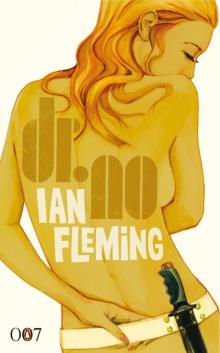 Doctor No
Doctor No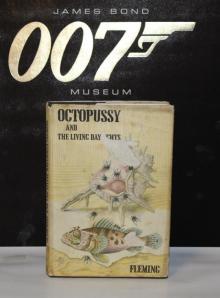 Octopussy & the Living Daylights
Octopussy & the Living Daylights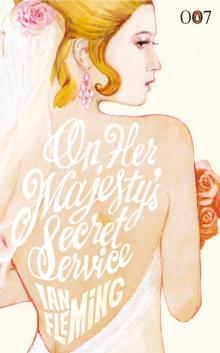 On Her Majestys Secret Service
On Her Majestys Secret Service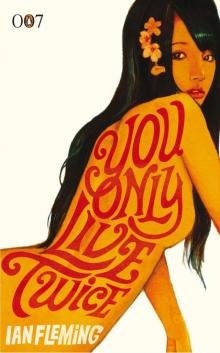 You Only Live Twice
You Only Live Twice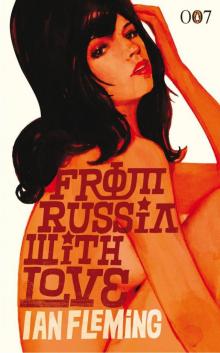 From Russia With Love
From Russia With Love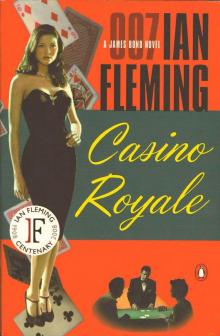 Casino Royale
Casino Royale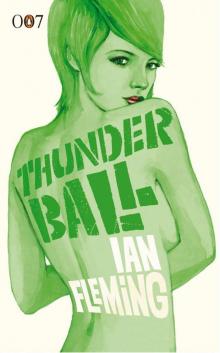 Thunderball
Thunderball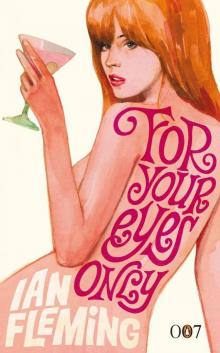 For Your Eyes Only
For Your Eyes Only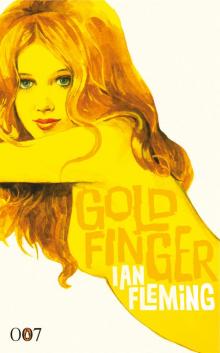 Goldfinger
Goldfinger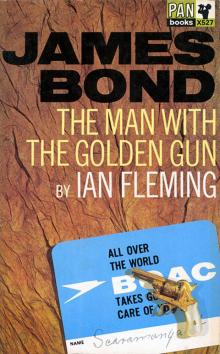 The Man With the Golden Gun
The Man With the Golden Gun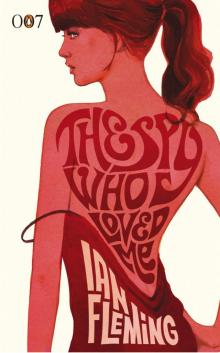 The Spy Who Loved Me
The Spy Who Loved Me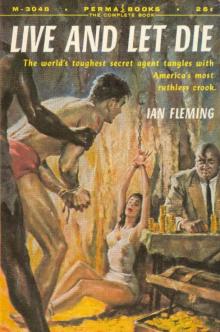 Live and Let Die
Live and Let Die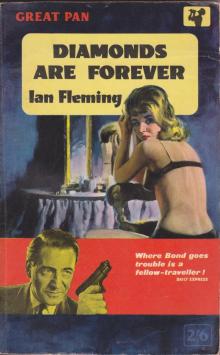 Diamonds Are Forever
Diamonds Are Forever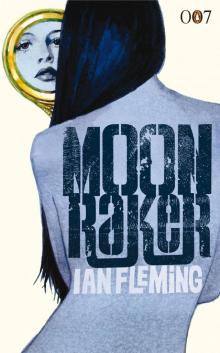 Moonraker
Moonraker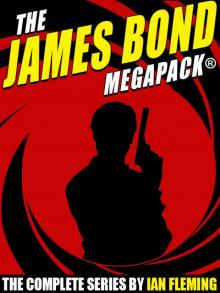 The James Bond MEGAPACK®
The James Bond MEGAPACK®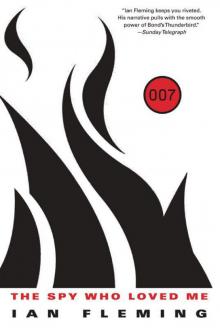 Bond 10 - The Spy Who Loved Me
Bond 10 - The Spy Who Loved Me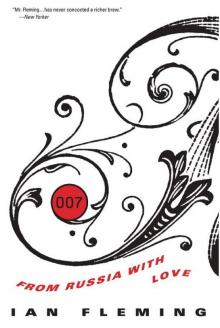 From Russia with Love (James Bond - Extended Series Book 5)
From Russia with Love (James Bond - Extended Series Book 5)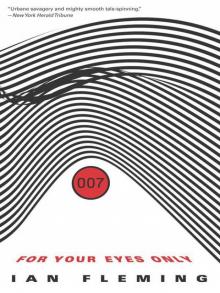 Bond 08 - For Your Eyes Only
Bond 08 - For Your Eyes Only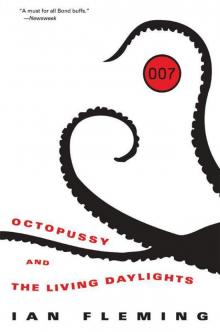 Bond 14 - Octopussy and the Living Daylights
Bond 14 - Octopussy and the Living Daylights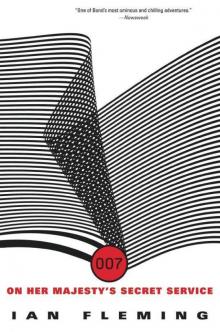 Bond 11 - On Her Majesty's Secret Service
Bond 11 - On Her Majesty's Secret Service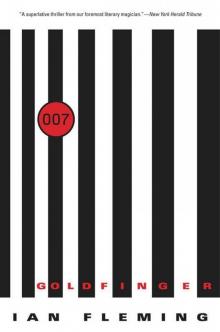 Bond 07 - Goldfinger
Bond 07 - Goldfinger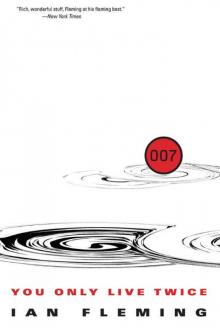 Bond 12 - You Only Live Twice
Bond 12 - You Only Live Twice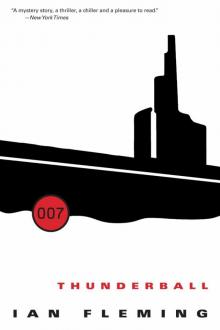 Bond 09 - Thunderball
Bond 09 - Thunderball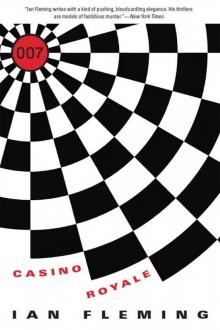 Bond 01 - Casino Royale
Bond 01 - Casino Royale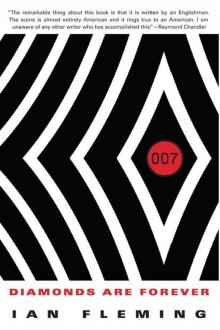 Diamonds are Forever (James Bond - Extended Series Book 4)
Diamonds are Forever (James Bond - Extended Series Book 4)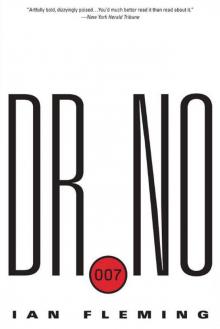 Bond 06 - Dr. No
Bond 06 - Dr. No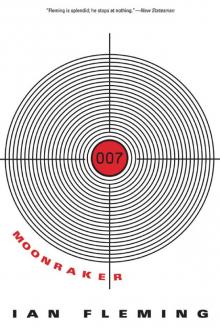 Moonraker (James Bond - Extended Series Book 3)
Moonraker (James Bond - Extended Series Book 3)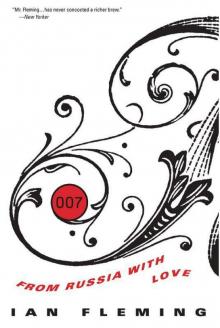 Bond 05 - From Russia With Love
Bond 05 - From Russia With Love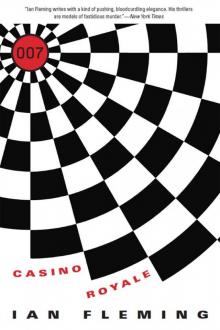 Casino Royale (James Bond - Extended Series Book 1)
Casino Royale (James Bond - Extended Series Book 1)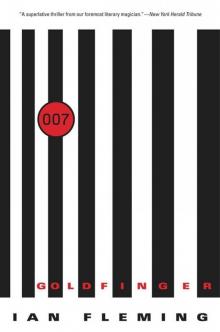 Goldfinger (James Bond - Extended Series Book 7)
Goldfinger (James Bond - Extended Series Book 7)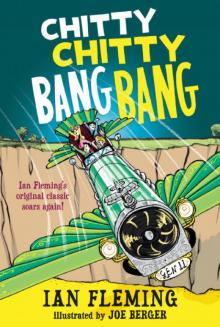 Chitty Chitty Bang Bang: The Magical Car
Chitty Chitty Bang Bang: The Magical Car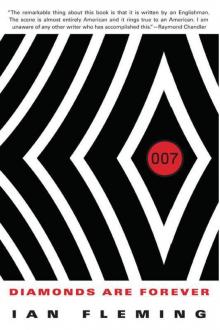 Bond 04 - Diamonds Are Forever
Bond 04 - Diamonds Are Forever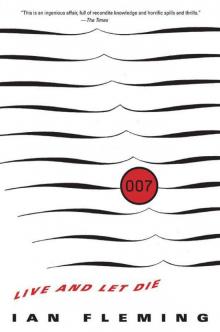 Bond 02 - Live and Let Die
Bond 02 - Live and Let Die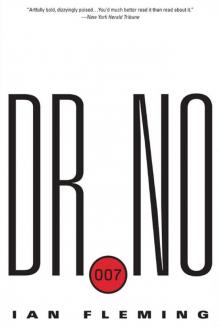 Dr. No (James Bond - Extended Series Book 6)
Dr. No (James Bond - Extended Series Book 6) The Hildebrandt rarity
The Hildebrandt rarity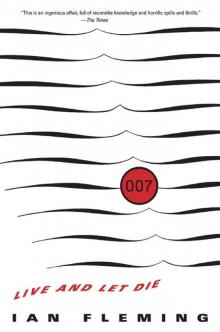 Live and Let Die (James Bond - Extended Series Book 2)
Live and Let Die (James Bond - Extended Series Book 2)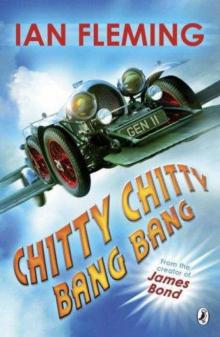 Chitty Chitty Bang Bang
Chitty Chitty Bang Bang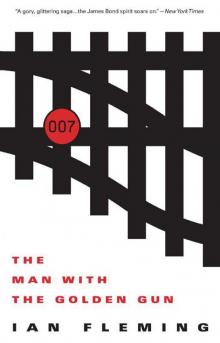 Bond 13 - The Man With the Golden Gun
Bond 13 - The Man With the Golden Gun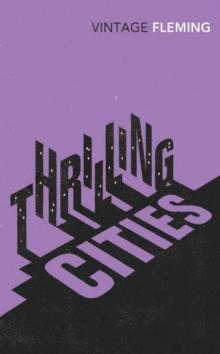 Thrilling Cities
Thrilling Cities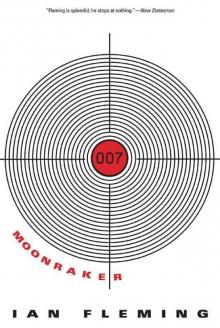 Bond 03 - Moonraker
Bond 03 - Moonraker